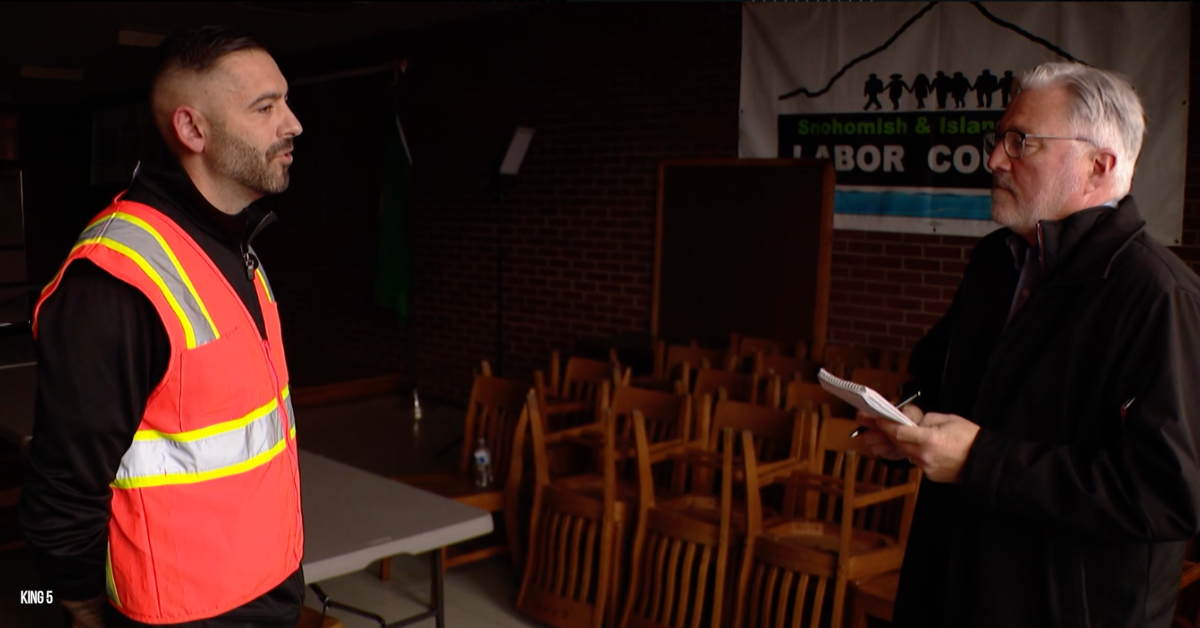NEWS ROUNDUP
Wage theft | Flight cuts | GOP split
Thursday, November 6, 2025
STRIKES
► From St. Louis Public Radio — The Boeing strike enters 4th month — here’s how it got to this point — Even so, the union estimates that the difference between its counterproposal and the most recent Boeing contract is about $8 million more over four years. In its third quarter earnings report released Oct. 29, Boeing posted $23 billion in revenue. “$8 million is a rounding error in the grand scheme of Boeing’s operations,” Rosenfeld said. “And so it does, from an outsider’s perspective, raise a question of, what exactly are we fighting about here?”
Editor’s note: During the 2024 Boeing strike even experts at the Wall Street Journal were scratching their heads at the company’s futile choice to dig in its heels for weeks before ultimately meeting most of the workers’ demands. A year later, the company doesn’t appear to have learned its lesson.
LOCAL

► From KING 5 — State investigates wage theft claims at major Lynnwood construction site — At least four construction workers at Lynnwood’s Enso apartment development claim they were forced to work overtime but were not properly compensated, prompting an investigation by the state Department of Labor and Industries…A construction worker, whose identity is being protected due to fears of industry reprisals, says employees worked nine to ten hours a day, six days a week for months, but their paychecks didn’t reflect the overtime hours. “I’m sad because it was unjust,” the worker said through a translator. He says workers put in 45 or more hours per week, but that saying “no” to the extended hours wasn’t an option if they wanted to keep their jobs.
► From KUOW — As AI threatens white-collar jobs, Washington trade schools are booming — Hancock is one of many job seekers turning to the skilled trades in search of stability at a time of uncertainty in the white-collar labor market. Apprenticeship programs in Washington state have been growing steadily over the past decade, as have pre-apprenticeship tracks in Seattle Public Schools. It’s a trend that was already underway due to rising college costs, the lingering effects of Covid, and evolving attitudes toward the trades. Now, fears of AI eliminating white-collar jobs are supercharging the shift.
► From the Seattle Times — For Amazon, Microsoft and other Seattle tech firms, it’s AI and anxiety — Microsoft has let go more than 15,000 workers since May, and Amazon announced last week it was cutting 14,000 roles. Artificial intelligence has taken some of the blame for the layoffs, but not in an obvious way. The companies aren’t in financial distress — far from it. Rather, there’s a desire now among the tech giants to trim their operations, to be lean and flexible enough to keep up with AI development. For the first time in tech’s recent history, allocating capital toward employees isn’t the top priority.
► From NW Public Broadcasting — More complicated: The government shutdown could slump work at the Hanford site — The U.S. Department of Energy’s Assistant Secretary for the Office of Environmental Management is visiting Hanford this week. His visit to the nation’s largest environmental cleanup site is less than two weeks since he was sworn in on Oct. 23…If the government shutdown persists, a source close to the leadership of the U.S. Department of Energy Hanford field office said the agency could ramp down to “essential personnel” by as early as next week. The source said that could mean that fewer than 10 Energy staffers for Hanford would be left, out of close to a couple hundred currently working.
► From the Spokesman Review — ‘They’ve been here for us’: Spokane County restaurants, caterers are filling food security gaps left by federal shutdown — On Wednesday, just a week after he started, Kazanjian said his sign-up sheet for the meals was already nearing capacity for the week. He would like to keep the program going and plans to reopen the list next week, but it’s become taxing, and the community needs are greater than what he can tackle alone, he said. “The phone’s just ringing off the hook all day,” Kazanjian said. “It’s really sad; there’s a lot of stories of people who haven’t had a meal in weeks. It’s so hard to turn people away in those situations.”…The old adage about Spokane being the biggest small town in America rings most true in times of hardship, Finau said.
► From My Northwest — Redmond Police temporarily shut down ‘Flock’ license plate reader program — The city council’s recommendation on Monday to turn off the “Flock” license plate reader cameras was unanimous. “I do support turning off the cameras at this time while we continue to evaluate what is both best in terms of technology, our department, and what our community wants,” Councilmember Melissa Stuart said. At Monday’s council meeting, Police Chief Darrell Lowe also said Immigration and Customs Enforcement (ICE) did not access Redmond’s system that day when agents detained multiple people there.
AEROSPACE
► From the Seattle Times — Criminal case against Boeing over deadly 737 Max plane crashes is dismissed by a US judge — In a written decision issued Thursday, U.S. District Judge Reed O’Connor approved the federal government’s request to dismiss its case against Boeing as part of a deal that requires the aircraft maker to pay or invest an additional $1.1 billion in fines, compensation for the crash victims’ families, and internal safety and quality measures.
NATIONAL

► From the AP — Most major US airports are among 40 targeted for shutdown flight cuts — The Federal Aviation Administration announced Wednesday it would reduce air traffic by 10% across “high-volume” markets to maintain travel safety as air traffic controllers go unpaid and exhibit signs of strain during the shutdown…Controllers already have missed one full paycheck and are scheduled to again receive nothing next week as the shutdown drags on. The FAA has been delaying flights at times when airports or its other facilities are short on controllers.
Editor’s note: the Seattle Times reports both SEA and PDX are likely impacted
► From Wired — The AI Data Center Boom Is Warping the US Economy — Rarely, if ever, has a single technology absorbed this much money this quickly. Warnings of an AI bubble are getting louder every day, but whether or not a crash eventually happens, the frenzy is already reshaping the US economy. Harvard economist Jason Furman estimates that investment in data centers and software processing technology accounted for nearly all of US GDP growth in the first half of 2025.
► From the Washington State Standard — DHS speeds rule that could permit more fines and arrests of protesters at federal buildings — Under the new rule, which took effect Wednesday, those fines can apply to people who commit crimes near federal property as well as on it, giving the Department of Homeland Security what it calls “enhanced charging authority.”…While implementation of the new fines was sped up since the start of protests outside immigration facilities this year, the new proposal was actually written before those protests began. They were drafted during the Biden administration by the General Services Administration, which operates federal buildings, and the Department of Homeland Security’s Federal Protective Service, which coordinates security.
► From Wired — ICE Wants to Build a Shadow Deportation Network in Texas — Early planning documents reviewed by WIRED describe a statewide transport grid designed for steady detainee transfers across Texas, with ICE estimating each trip to average 100 miles. Every county would have its own small, around-the-clock team of contractors collecting immigrants from local authorities deputized by ICE. It is a subtle transfer of the physical custody process into the hands of a private security firm—authorized to carry firearms and perform transport duties “in any and all local, county, state, and ICE locations.”
► From the Washington Post — From groceries to gas, Americans say they’re spending more under Trump — About 7 in 10 Americans say their grocery costs have risen in the past year, while about 6 in 10 say their utility costs have edged higher, according to the poll, conducted in late October. Roughly 4 in 10 say the same about health care, gas and housing. The findings reflect angst about the cost of living, which has emerged as a key issue in the off-year elections across the country on Tuesday.
► From Common Dreams — ‘Mega-Layoffs’ Under Trump as Corporations Have Cut 1 Million Jobs This Year—Most Since 2003 — As reported by the Washington Post on Thursday, new data from corporate outplacement firm Challenger, Gray & Christmas found that employers in October announced 153,000 job cuts, which marked the highest number of layoffs in that month since October 2003. Total announced job cuts in 2025 have now reached 1.1 million, a number that the Post describes as a “recession-like” level comparable to the steep job cuts announced in the wake of the dotcom bust of the early 2000s, the global financial crisis of 2008, and the onset of the Covid-19 pandemic in 2020.
POLITICS & POLICY

► From OPB — Longest government shutdown ever rocks Pacific Northwest as parties remain at odds — Funding for the federal Supplemental Nutrition Assistance Program, or SNAP, ran out over the weekend. Two judges ordered the Trump administration last week to use emergency reserve money to buoy the program that helps more than 757,000 Oregonians and more than 905,000 Washington residents buy groceries. But President Donald Trump says his administration will only provide partial payments to states. “The president is choosing how to spend money. He’s spending millions of dollars every day to keep 400 National Guard troops in Oregon sitting in bases,” Gov. Tina Kotek said in an interview on OPB’s Think Out Loud on Tuesday, referring to troops the president is seeking to deploy to protect the U.S. Immigration and Customs Enforcement building in Portland.
► From the New York Times — Some SNAP Recipients May Not Receive Food Stamps in November Amid Government Shutdown — Millions of low-income Americans will see staggering cuts and delays to their food stamps this month — with some receiving potentially nothing at all — because of the way that the White House has chosen to pay partial benefits during the government shutdown…The problem stems from the way in which the administration has opted to fund benefits, and the intricate rules it has foisted on states this week to calculate aid amounts for the 42 million people enrolled in SNAP. For nearly 1.2 million households, or almost five million people, the changes may result in benefits of $0 in November…As a result, groups of cities, states, nonprofits, religious organizations and others have recently returned to federal court, where they have raised fresh concerns that the White House is not complying with court orders that require the government to provide food stamps swiftly this month.
► From the Washington Post — Republicans shaken by election losses — and split on how to fix things — Trump, who faces low approval ratings in polls less than a year into his second term, offered his own prescription, blaming his party’s bruising election night losses on the ongoing government shutdown and urging Republicans to end the funding gridlock, which is the longest in U.S. history…“We have to get the country open. And the way we’re going to do it this afternoon is to terminate the filibuster,” Trump said during a meeting with Republican senators at the White House, referencing a procedural rule in the Senate that requires 60 votes to pass most legislation. “We will pass legislation that you’ve never seen before, and it’ll be impossible to beat us.”
► From KUOW — Here are 6 ‘Beautiful Bill’ tax changes that will benefit wealthy Americans — Tax and estate consultant Gary Phillips, based in New York, says as tax season approaches, the mood is upbeat among his clients. The reason? The extension of a series of tax breaks approved by the Republican-led Congress this past summer as part of President Trump’s “One Big Beautiful Bill” that mainly benefit high-net-worth and high-income people. “We have a lot of happy clients,” says Phillips, who handles taxes, trusts and estates at Cole Schotz P.C. “There’s more certainty now.” The changes approved by lawmakers in July lock in a friendlier tax climate for affluent Americans with lower rates and generous exemptions.
► From the Seattle Times — The 10 most vulnerable House members, a year out from 2026 elections — Newly enacted maps in a handful of states have influenced where some lawmakers land on our top 10 list of the most vulnerable House incumbents 365 days before Election Day 2026…Gluesenkamp Pérez twice beat Republican Joe Kent, a retired Green Beret and MAGA favorite, in this Southwest Washington district that’s a mix of rural, suburban and urban communities. This time, she’s facing John Braun, the top Republican in the Washington Senate, with Kent taking a top counterterrorism role in the Trump administration. Republicans are hoping Braun’s government experience and less combative approach to politics will appeal to the district’s independent-minded voters who were turned off by Kent. But Democrats say Gluesenkamp Pérez’s voting record and willingness to occasionally buck her party will once again help her prevail.
► From the Washington State Standard — Fewer than 200 votes separate Democrats dueling for WA state House seat — Kevin Schilling’s lead on state Rep. Edwin Obras shrank to 199 votes in their 33rd Legislative District duel in south King County. The district includes Burien, Normandy Park, Des Moines, SeaTac and much of Kent. Schilling, the mayor of Burien, led Obras by 358 votes on Tuesday night. More votes will be counted in the days ahead. “We are excited we got a lot closer. We will keep looking at the numbers the next couple days but this is a good sign,” said John Wyble, Obras’s campaign advisor. “The most important thing is that every vote is counted.”
► From the Bellingham Herald — Unrepresented WWU students preparing bargaining rights bill for 2026 session — Students at Western Washington University are working to pass a new bill that would extend collective bargaining rights to student workers not covered by previous laws. Currently, only educational student employees (ESEs) at WWU are covered by state legislation and are officially recognized as a part of Western Academic Workers United. ESEs include tutors, teaching assistants, lab assistants, faculty assistants, research assistants, library assistants and peer advisers. Operational student employees (OSEs), which include resident advisers, program support staff, assistants, editors and laborers, are not recognized. Out of 2,300 student employees at Western, 1,200 are OSEs, according to the WAWU website.
► From OPB — Prominent Republicans head toward losses in Southwest Washington general election — As of Wednesday night, Camas City Councilor Leslie Lewallen was trailing in her re-election bid by 12.5 percentage points. In Longview, Mayor Spencer Boudreau was losing by 14.6 percentage points. Both failed to close substantial gaps in the latest election counts after Tuesday’s election. They’re just two examples of notable Southwest Washington Republicans losing in elections as the party saw several defeats across the country.
► From Cascadia Daily News — Update: Two tenants’ rights initiatives will likely pass in Bellingham and Ferndale — Ferndale voters for the first time in the city’s history weighed in on a citizen initiative that limits “junk fees” charged by landlords, after a signature-gathering campaign led by Community First Whatcom…The Ferndale City Council in October voted 5-2 to formally oppose the initiative and send a message to voters. But Ferndale voters appeared to disregard that message, with early returns indicating that the measure will pass. On Wednesday night, the initiative had 70% approval with 3,030 votes counted. The advocacy group appears to have notched multiple wins in the 2025 election; in Bellingham, as of Nov. 5, another citizen-led initiative that protects tenants’ ability to organize looks almost guaranteed to pass with 72% approval.
INTERNATIONAL
► From the BBC — Grand Theft Auto studio accused of ‘union busting’ after sacking workers — The Independent Workers’ Union of Great Britain (IWGB), which represents people working in the gaming sector, said 31 workers were fired from Rockstar’s UK studios on 30 October. The union led rallies outside the company’s offices in Edinburgh and London on Thursday to protest what it described as “the most blatant and ruthless act of union busting in the history of the games industry”.
The Stand posts links to local, national and international labor news every weekday morning. Subscribe to get daily news in your inbox.





